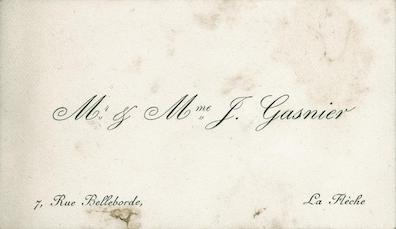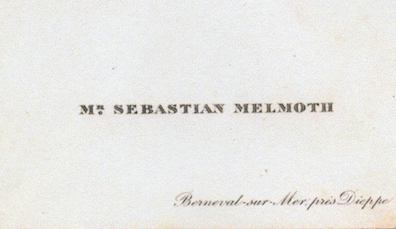The nameless "White slip of paper" that Bloom checks in Calypso,
to make sure that it is "Quite safe" inside the leather
sweatband of his hat, figures more prominently in Lotus
Eaters. There, it turns out to be not really a slip of
paper but rather a "card"—what Victorians and Edwardians
called a "calling card" or "visiting card," the equivalent of
our "business cards" today. Bloom presents it at the post
office to collect poste restante mail from his erotic
pen pal Martha Clifford, under a pseudonym. Before entering
the post office, in a performance calculated to remove any
suspicion about his clandestine correspondence he moves the
card from his hat to a pocket of his vest. It is one of
several moments in the book when Bloom sees himself as others might
and takes ingenious and probably excessive precautions to hide
his intentions from them.
The first-time reader of Calypso cannot know what
to make of the paper, other than to note that Bloom thinks he
has hidden something well. Lotus Eaters reveals the
card's true nature when Bloom hands it "through the brass
grill" of the post office window, asking "Are there any
letters for me?" When he reads the envelope that is handed to
him, it becomes clear that he carries in his hat a card
bearing the name "Henry Flower,
Esq." The calling cards of the day sometimes bore simply the
person's name, and sometimes added an address. Henry lists his
address as the Westland Row post office box.
Bloom, then, has invented a respectable alias to cover his
epistolary affair; he has set up a postbox for the fictive
Henry at a site far removed from his own neighborhood; and he
has apparently had cards printed to avoid having to pronounce
the name Henry Flower in a public setting where someone who
knows that he is not Henry might hear him saying it. To make
even more sure that he will not be detected, before entering
the post office he checks to see that there is no one but the
postmistress in the lobby: "From the curbstone he darted a
keen glance through the door of the postoffice. Too late box.
Post here. No-one. In."
Nor is that the end of his Odyssean cunning. While he is
still across the road from the post office he enacts an
elaborate charade to move the card, by sleight of hand, to a
place that a respectable gentleman might keep such an item: "he
took off his hat quietly inhaling his hairoil and sent his
right hand with slow grace over his brow and hair. Very warm
morning. Under their dropped lids his eyes found the tiny
bow of the leather headband inside his high grade ha. Just
there. His right hand came down into the bowl of his hat.
His fingers found quickly a card behind the headband and
transferred it to his waistcoat pocket." Once more
he thinks, "So warm," and (in a Gabler
textual emendation that makes much better sense of the
following sentences and is adopted on this website) he once
more passes his hand over his brow and hair and returns the
hat to its rightful place.
Of this remarkable performance, Peter Kuch writes in Irish
Divorce: Joyce's Ulysses (Palgrave Macmillian, 2017)
that "It is now eleven o'clock, and it is warm but not hot.
But by pretending it is 'rather warm,' Bloom devises a
sequence of gestures that will conceal what he is actually
doing—that is, transferring the card from his hat to his
waistcoat. All his gestures become self-consciously
choreographed. . . . What had been a quick and somewhat
furtive action before breakfast has become, barely an hour
later, a subterfuge that is as complex as it is
self-consciously orchestrated, performed meticulously as it
were before a wholly imagined audience" (75).
A smaller but very similar
charade in Lestrygonians shows Bloom
disguising his intentions not to preserve his sexual
reputation but to guard against offending others. In their
defensiveness both passages seem to anticipate the
hallucinations of Circe, where Bloom is repeatedly
accused of doing shameful things.

